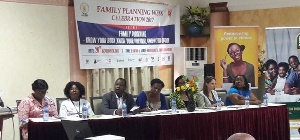Ghana is currently faced with a challenge of short birth intervals which are often associated with chronic malnutrition and this, in turn, contributes to about 50 percent of child deaths, Mrs. Tina Mensah, a Deputy Minister of Health, has said.
She said maternal mortality is the second largest cause of female deaths in the country.
Mrs. Mensah said this in a speech read on her behalf by the Executive Director of the Ghana Population Council, Dr. Leticia Adelaide Appiah at the launch of the 2017 Family Planning Week Celebration.
The event was held under the theme: “Family Planning: Know your Body, know your partner, know your option.”
She said Government has made four important commitments at the 2017 World Summit of Family Planning which include supplies and services of family planning for national health benefit and increasing government contribution into buying family planning commodities with regards to programming and service delivery.
“Government is also committed to increasing the number of women using modern contraception from 1.46 to 1.93 million by the year 2020, is and committed to scheme out sexual and reproductive health interventions to increase the percentage of sexually active adolescent using contraceptives from 31.5 to 35 percent by the year 2020.”
Mrs. Mensah said knowing one’s body is essential in appreciating how different contraceptives work to prevent pregnancy, knowing your partner includes the quality of lives of individuals and cooperation of spouses during the use of family planning and individuals or couples who know their options are better equipped with the provider’s support.
She said family planning and the use of contraceptives is a serious and personal decision made by informed couples or individuals.
Madam Akua Kwarteng-Addo, a Director at the Health Office of the United States Agency for International Development and Chairperson of the launch, said family planning methods have improved over the past years though there is more room for improvement.
She said statistics in Ghana shows that about 30 percent of sexually active Ghanaian women do not want to give birth and do not use contraceptives, only 36 percent aged 15 to 49 knows their fertility period and 63 percent of couples makes family planning their choices.
Madam Kwarteng-Addo said there was the need for couples to understand all the family planning options and methods in ensuring the number of children they want to have.
General News of Thursday, 28 September 2017
Source: GNA
Celebration of 2017 Family Planning Week launched
 Mrs. Tina Mensah said maternal mortality is the second largest cause of female deaths in the country
Mrs. Tina Mensah said maternal mortality is the second largest cause of female deaths in the country












